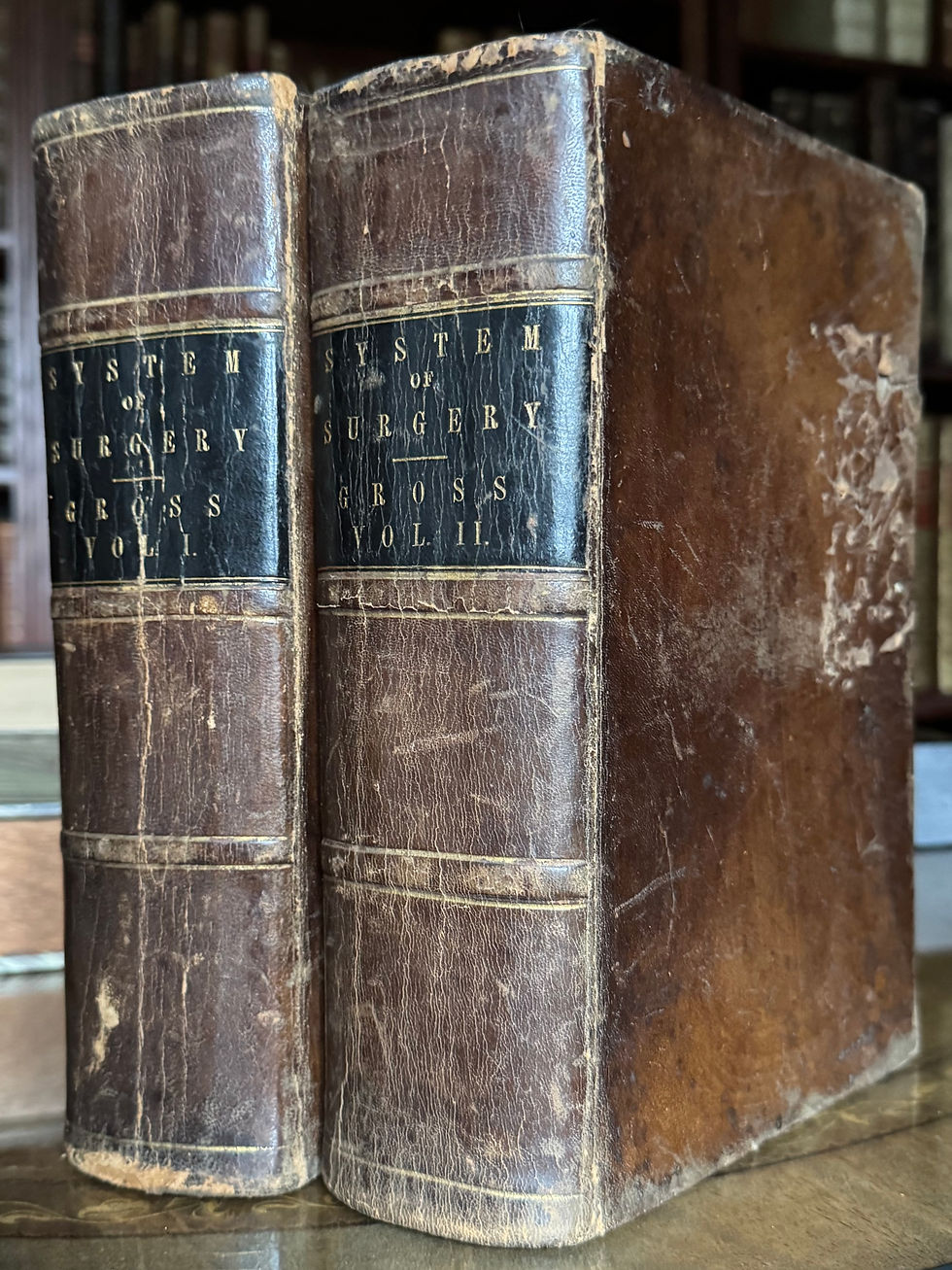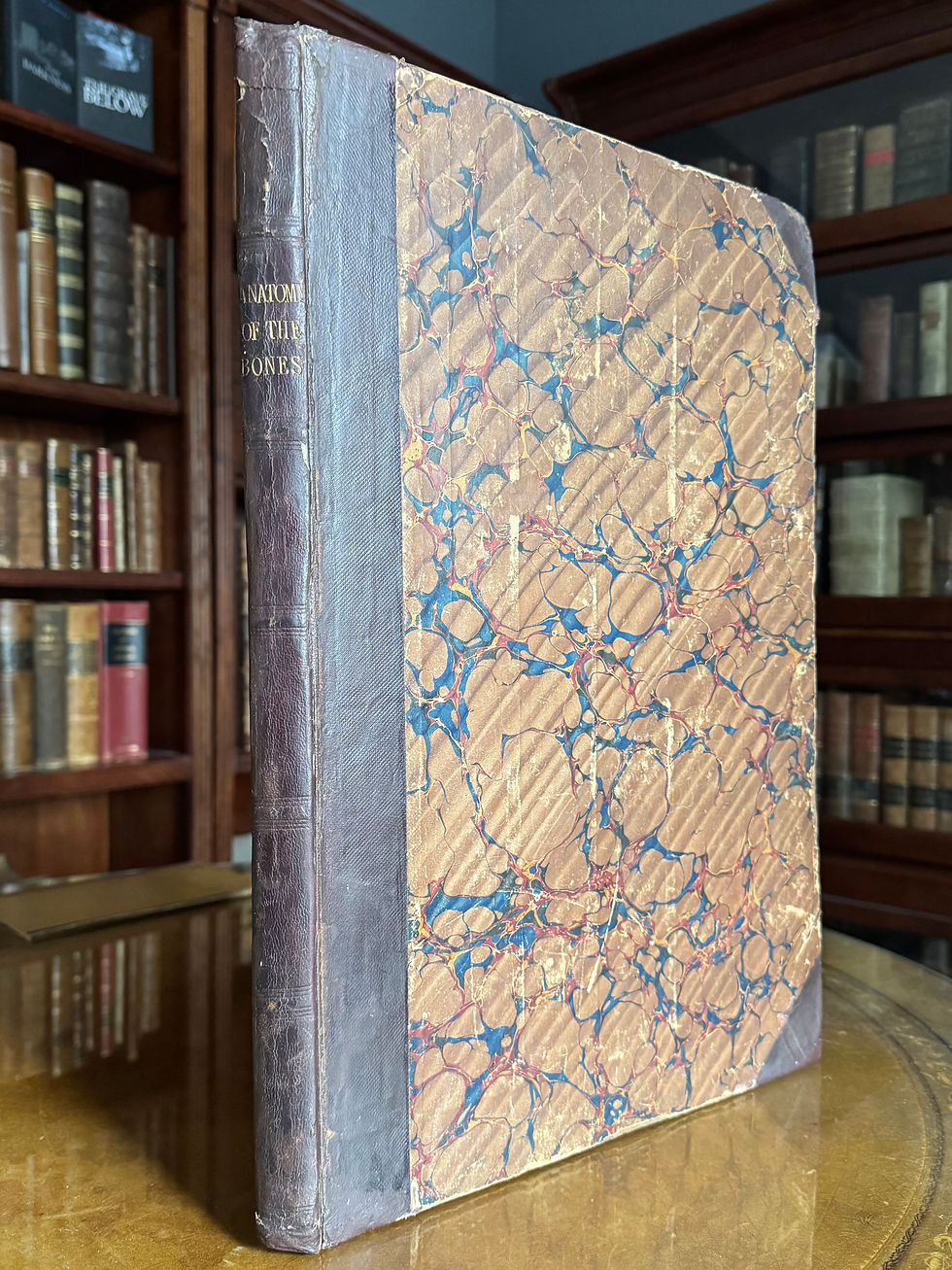YOUNG, Edward. Night Thoughts. 1809.
YOUNG, Edward. Night Thoughts on Life, Death, & Immortality. To Which is added, Thoughts on the Late Rebellion; and A Paraphrase on Part of the Book of Job. By Edward Young, L. L. D. A New Edition. London, 1809.
Half leather binding with marbled paper over boards. Leather greatly scuffed. Boards reattached and back reattached by a strip of brown binder’s material somewhat resembling buckram, somewhat resembling binder’s tape. Internal hinges reinforced by white binder’s tape. Corners bumped. Cord at top edge hanging on by a thread. Folding frontis piece of contemplative individual in moon and starlit cemetery in churchyard present and in good condition. Title page also present. Interior in good repair with clean pages, retained margins, and binding tight. Quaint little black ink doodle on rear pastedown of crude skeletal or angelic figures holding hourglasses and escorting a shade away. One flying figure with word bubble reads “good” (I suspect the binder’s tape in the hinge is covering another word balloon which reads “bye” but I cannot prove that). Prior owner’s marks on front paste down and ffep.
The Oxford Companion to English Literature, Revised Edition, edited by Margaret Drabble, 1995, gives the following:
Page 1106: “Young, Edward (1683-1765), born near Winchester and educated there and at Oxford. His early works include the tragedies Busiris, successfully produced at Drury Lane in 1719, and The Revenge, produced at the same theatre in 1721. In 1725-8 he published a series of satires under the title The Universal Passion (the love of fame), which were much admired until eclipsed by those of Pope, who was a few years younger. Disappointed in more worldly ambitions, he took orders and became rector of Welwyn in 1730, where he spent the remainder of his long life; in 1731 he married Elizabeth Lee, daughter of the second earl of Lichfield, who died in 1740. Young’s most celebrated poem, The Complaint, or Night Thoughts on Life, Death and Immortality (1742-5) is thought to commemorate her, her daughter by previous marriage, and her son-in-law. A noted example of the graveyard genre, it was extremely popular both in England and in Europe.”
Page 711: “...a didactic and reflective poem of some 10,000 lines of blank verse, in nine books.... This work was extremely popular and had considerable influence in Europe, where it was admired by Klopstock, Diderot, and Robespierre, among others. It is a long and somewhat rambling meditation on life’s vicissitudes, death, and immortality, and includes lines which have become proverbial, such as ‘Procrastination is the thief of time’ (Bk 1, l. 393). The poet deplores the deaths of Lucia, Narcissa, and Philander, loosely identified as his wife, his stepdaughter, and her husband; he also addresses much reproof and exhortation to the worldly and infidel young Lorenzo, a character unlikely to be based on his own son, as many supposed, for the boy was only eight when the poem was begun. Thus a certain narrative and autobiographical interest is added to evocations of ‘delightful gloom’ and the ‘populous grave’.”
Page 418: “Graveyard poets, a term applied to 18th–cent. poets who wrote melancholy, reflective works, often set in graveyards, on the theme of human mortality. Examples include T. Parnell’s ‘Night-Piece on Death’ (1721), E. Young’s Night Thoughts (1742), and R. Blair’s The Grave (1743). See also Gray’s Elegy Written in a Country Church-Yard (1751), the best-known product of this kind of sensibility.”
















